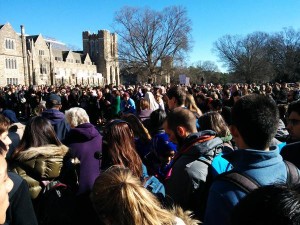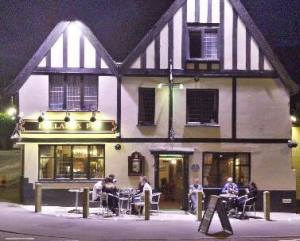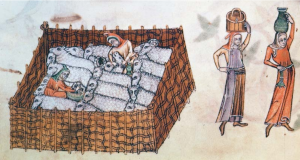Godless Morality: David Brooks, Wendell Berry, NPR, and Mayberry, North Carolina
If I were one of a homosexual couple — the same as I am one of a heterosexual couple — I would place my faith and hope in the mercy of Christ, not in the judgment of Christians. – Wendell Berry
A few years ago I realized that I wanted to be a bit more like those people. I realized that if I wanted to do that I was going to have to work harder to save my own soul. – David Brooks
Two links about morality appeared on my twitter feed this week. One describes David Brooks’s “moral bucket list.” The other is on Christianity and debates about homosexuality in the United States, by Wendell Berry. People within a select demographic were sharing David Brooks like caramel popcorn. While I washed the breakfast dishes, NPR announced they would be visiting with Brooks about his new book on morality. Even though this is WUNC (NPR in North Carolina) I do not remember hearing them run a piece featuring Wendell Berry, well . . . ever, even though Berry is a celebrated scholar, environmental activist, novelist, and poet from our near cousin, Kentucky. Granted, I do not listen to WUNC every waking moment. But, during the time I do listen to WUNC, I hear more from David Brooks than I think it helpful to hear.
I need to give credit to a Christian friend on twitter for pointing out that the most basic problem with David Brooks’s essay on morality is that he believes he can save his own soul. For Christian readers, this is fundamental. And some of the problems in his essay follow from this fundamental belief. Using mere snippets from the lives of three different women – Dorothy Day, Frances Perkins, and Mary Ann Evans (George Elliot) – Brooks deftly repeats an idea that is circulating on the New York Times and in the related reading and listening universe. If I am to gain myself, or “save my own soul,” I need to figure out a way actively to lose myself within a larger truth or project. Another pagan writer who has popularized this form of morality for an NPR-listening demographic is pseudo-scientist Jonathan Haidt, who encourages readers to embrace a form of “altruism” that simulates a hive of bees or a colony of ants. (Haidt has also written a NYT bestselling book on “morality.”)
The essay David Brooks featured this week helps illumine what is wrong with a “pull myself down by my own boostraps” morality. Brooks diagnoses his whole reading public with this phrase: “the culture of the Big Me.” There are obvious problems with this broad diagnosis and prescription for readers outside the NPR demographic, and even some of us who do listen to NPR. Some people need not imagine struggling or humility because we are daily struggling or dealing with humiliation. Although people struggling economically may embrace this false gospel of austerity, the popularity of prosperity gospel churches attests to people’s hunger for miracles that will grant us economic security and reassurance that we are worth saving.
Now for the more subtle problems in his essay. The words Brooks uses for these three women matter. Perkins was “shamed” and “purified.” She “turned herself into an instrument.” Day was saved by the birth of her daughter, which moved Day from living a “disorganized” life to one of direction. Becoming a mother, by Brooks’s brief account, allowed Day to lose what he calls “the natural self-centeredness all of us feel.” Mary Ann Evans “stabilized” by choosing a good man. Her writing flourishes because she found a strong partner to be her psychological splint. So, to recap, Day is saved by childbearing, Perkins through socialism, and Evans through a good mate. Do not get this twisted. I am all for mothering, socialism, and the blessed kismet of happily sexual monogamy. But none of these choices, commitments, or chances can “save my soul.” Only Jesus Christ saves my soul. Into the vacuum left by Jesus Christ, Brooks inserts serviceable hagiographies of three complicated, merely mortal women. The problem is a “Big Me,” and so three women become icons for the project of “Us,” thereby saving their own souls and offering everyone living within this “Big Me” culture a model for life. If by chance you are a non-Christian reading my blog post, and you are not troubled by the ways that Brooks is only vaguely deist, please at least note that his gender politics are Edwardian.
The contrast between Wendell Berry and David Brooks is helpful. Wendell Berry is becoming more specifically Christian and politically radical as he grows older and even more courageous. When I say radical, I mean Berry struggles with the at-the-roots-digging required for Christians to argue with one another about the mundane, local particulars of our faith. Berry has always written about individual characters and from a very specific place. He has become even more tenaciously local in the last decade, sleeping on the floor of the Kentucky state house and pulling his papers from the University of Kentucky over the ecological depredation of his home state. He has put his body and his working legacy where his mouth is.
David Brooks, in contrast, is attractive to Christians who want a form of morality that skims across the surface and can travel across the boundaries that slightly distinguish people who read The New York Times. Brooks’s form of self-salvific, blurry Judeo-Christian morality is like Veggie Tales for grown-ups. It is shallow, and it is not Christian.
The two essays that came across my radar this week really crystalized this problem for me. Read Wendell Berry’s words on Christian faith, homosexuality, and what it would look like, in particular, if Christians in the United States ask governmental authorities to become involved in the policing of sexuality. Berry dares indecorum:
If one accepts the 24th and 104th Psalms as scriptural norms, then surface mining and other forms of earth destruction are perversions. If we take the Gospels seriously, how can we not see industrial warfare — with its inevitable massacre of innocents — as a most shocking perversion? By the standard of all scriptures, neglect of the poor, of widows and orphans, of the sick, the homeless, the insane, is an abominable perversion.
Do we need a legal remedy for this? Would conservative Christians like a small government bureau to inspect, approve and certify their sexual behavior? Would they like a colorful tattoo verifying government approval on the rumps of lawfully copulating parties? We have the technology, after all, to monitor everybody’s sexual behavior, but so far as I can see so eager an interest in other people’s private intimacy is either prurient or totalitarian or both.
Perhaps the most dangerous temptation to Christianity is to get itself officialized in some version by a government, following pretty exactly the pattern the chief priest and his crowd at the trial of Jesus . . . For want of a Pilate of their own, some Christians would accept a Constantine or whomever might be the current incarnation of Caesar.
I would recommend also his granularly poetic essay on the challenge of living in the supposedly “new” south and being committed to a particular community and patch of land. Wendell Berry is not against my becoming part of an “us.” Or your becoming a part of a cause or project or family larger than yourself. But that “us” will not save my soul. Also, the particulars of morality will involve “our” commitment to much trickier, stickier dynamics than those that divide like-minded, cosmopolitan moralists.
One comment on Twitter put this beautifully. I noted that some of my former (usually male, southern) students who love Wendell Berry like his writing inasmuch as they can use his work nostalgically, to harken back to a Mayberry, NC that never was. This beautifully candid, United Methodist pastor wrote in response:
I grew up there, so I get the appeal . . . well . . . a poorer, more narcotics addiction, and violent Mayberry. Ok, maybe not Mayberry.
That is just it! Mayberry was not ever Mayberry. If I am looking to a nostalgic prior where morality was simpler, and people were better, I am not only deluding myself about the past, I am likely to blur the lines of the real divides that keep neighbor from neighbor and sibling from sibling. The cosmopolitan “everyone” that Brooks assumes is perhaps, basically, his own “Big Me” written large onto the moral universe. Brooks’s problem may be ego. I do not know him. But to shoe-horn all of everything that is “morality” into the need for humility and loss-of-self is to lose perspective on one’s actual neighbors and friends. Wendell Berry risks offense by calling out his actual neighbors and friends, sitting down with his actual body, risking bad-manners for the sake of truth-telling. (His Jefferson lecture, linked above, is a specifically blessed piece of truth-telling for people who work or study at Duke, by the way.)
On the odd days that I realize I cannot save my own soul, and that only Jesus saves, I am a little more apt to feel freed to reckon even with the contentious politics of sexuality in my beloved home state of North Carolina. I am more apt to listen to the anxieties about change that lead some people to view their gay and lesbian neighbors as competitors in a struggle for mere survival. What I am led to is less about “altruism,” and more akin to something like obstinate solidarity. At least for this “big me,” that work of listening, trusting my own wisdom, and finding the truth is harder than losing myself, purifying myself, or making myself into an instrument for any project – local or larger. My father is fond of telling me that I cannot save the world. That job has been taken. My sisterly message to David Brooks is this. You cannot save your own soul. That job has been taken. Thank God.






